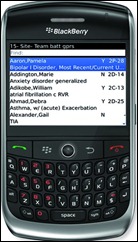News 1/6/11
Allina Hospitals & Clinics endorse Greenway’s PrimeSUITE EHR/PM solutions for affiliated regional providers. Key was Greenway’s ability to interface PrimeSUITE with Allina’s Epic acute care and ambulatory EMR.
The six-provider Cancer Centers of North Carolina–Asheville implements iKnowMed’s oncology-specific EMR. iKnowMed is a division of US Oncology, which is now owned by McKesson.
American Medical Group Association adds four new members to its board of directors.
More doctors are embracing Web-camera visits using services such as Skype. It’s unlikely to replace in-person visits, but providers are increasingly comfortable with the technology as an alternative for short follow-up visits or initial consults with long-distance patients. A big question mark is how patients can and should be billed for video appointments, which tend to be shorter than in-office visits, but longer than e-mail or text interactions. I suspect concierge practices might be the among the early adopters since most of those providers charge patients a flat monthly fee for all visits.
AT&T adds MedApps’ products to its ForHealth portfolio of offerings. AT&T will provide 3G connectivity to the MedApps remote monitoring solution suite and will co-sell MedApps’ remote care monitoring hub and enterprise back-end solutions.
Providers participating in the CentraState Healthcare System (PA) HIE will have an option to use the MobileMD’s EMR Light offering. CentraState is deploying MobileMD products across its medical community and will configure, manage, and support CentraState’s HIE technologies.
MedicalEdge Healthcare Group becomes part of Texas Health Resources in what is thought to be the second largest transaction of its kind. MedicalEdge includes 420 physicians and 2,300 employees. In a side deal, THR also acquires PhysServe, MedicalEdge’s MSO, and plans to sell PhysServe to THR’s joint venture partner, MedSynergies. Despite predictions that the acquisition will improve patient care, you can be assured the primary objective is to increase THR’s healthcare footprint and align physicians for a future ACO.
Other recent deals involving hospitals purchasing practices:
- Mount Nittany Medical Center (PA) absorbs the 51-physician Centre Medical and Surgical Associates
- The Tampa Bay Heart Institute at Northside Hospital acquires the 16-physician Heart and Vascular Institute of Florida South
- Saint Joseph Mercy Health System buys Michigan Heart, a practice with 33 cardiologists and 10 nurse practitioners and physician assistants
- WakeMed Health & Hospitals (NC) adds three practice and a total of 13 physicians.
In doing a bit of Web surfing today, I noticed that HIStalk sponsor Kareo is offering a couple of free webinars this month on how physicians can make medical billing easier and increase profitability. Details here.
I also see Navicure has a free guide for physicians preparing for the 5010 transition. Yikes. The 5010 deadline is officially less than a year away. Navicure is also hosting a webinar January 13th to discuss 2011 reimbursement and the challenges and opportunities for medical practices.
An internal medicine physician completes a review of Motion J3500 tablet, which he was considering for his practice. He seems to know his stuff, having previously used other Motion devices, as well as the Fujitsu Lifebook, Lenova X61, and HP TouchSmart tm2. His bottom line: the unit is powerful and “has no competition” if you want to use a tablet that can serve as a desktop replacement. However, a fully loaded unit runs over $4,000, is a bit heavy at nearly four pounds, lacks a forward-facing camera, and needs more external control options. In addition, the doctor found he only got 2:45 of use on two fully charged batteries. He concludes by saying he’ll wait for the introduction of other Windows 7 touch screen slates before making a purchase.

























The article about Pediatric Associates in CA has a nugget with a potentially outsized impact: the implication that VFC vaccines…